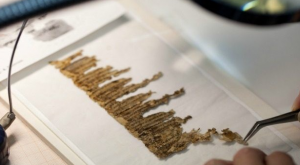When Washington’s $500 million Museum of the Bible held its grand opening in November 2017, attended by Vice President Mike Pence, there were questions even then about the authenticity of its centerpiece collection of Dead Sea Scrolls.
Now the museum has been forced to admit a painful truth: Technical analysis by a team of German scholars has revealed that at least five of the museum’s 16 scroll fragments are apparent forgeries.
The announcement has serious implications not only for the Bible Museum but for other evangelical Christian individuals and institutions who paid top dollar for what now seems to be a massive case of archaeological fraud.
Jeffrey Kloha, chief curator for the Museum of the Bible, said in a statement that the revelation is “an opportunity to educate the public on the importance of verifying the authenticity of rare biblical artifacts, the elaborate testing process undertaken and our commitment to transparency.”
The scrolls are a collection of ancient Jewish religious texts first discovered in the mid-1940s in caves on the western shore of the Dead Sea in what is now Israel. The massive cache of Hebrew documents is believed to date back to the days of Jesus. With more than 9,000 documents and 50,000 fragments, the entire collection took decades to fully excavate.
Read more HERE
Ask me anything
Explore related questions





